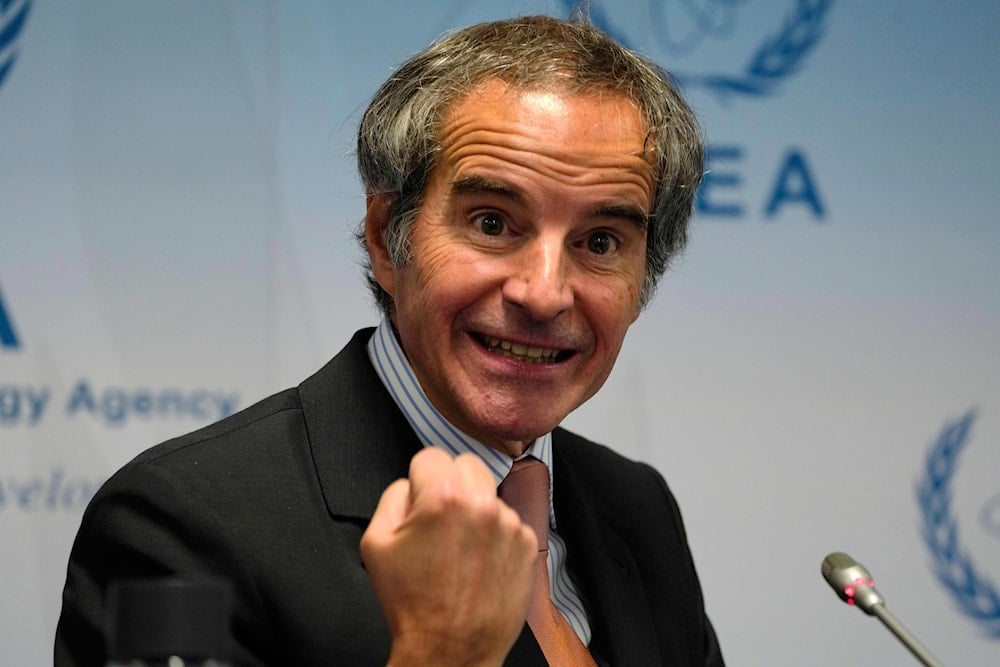Reuters: IAEA claims Iran has undeclared nuclear activity
Despite Iran’s continued assertions of transparency in its nuclear activities, the IAEA accuses Tehran of past undeclared operations and highlights a growing uranium stockpile in its latest report.
-

Rafael Mariano Grossi, the director-general of the International Atomic Energy Agency, speaks to journalists attending a weeklong seminar at the agency in Vienna, Austria, on Wednesday, May 28, 2025. (AP)
The International Atomic Energy Agency (IAEA) has issued two new reports on Iran’s nuclear activities, including a comprehensive assessment alleging undeclared operations at multiple sites until the early 2000s.
According to a quarterly report seen by Reuters, Iran’s total enriched uranium stockpile has risen by 953.2 kg, reaching an estimated 9,247.6 kg. The report alleged that 408.6 kg of this stock is enriched to 60% purity, exceeding the IAEA's theoretical threshold (42 kg) for weapons-grade potential if further enriched. Meanwhile, uranium enriched to 20% purity has dropped to 274.5 kg, still more than double the IAEA’s 125 kg benchmark for potential weaponization.
The agency’s second, more detailed “comprehensive” report focuses on three previously undeclared sites, Lavisan-Shian, Varamin, and Turquzabad, which the IAEA claims hosted structured nuclear activities involving undeclared nuclear material until the early 2000s.
“Iran retained unknown nuclear material and/or heavily contaminated equipment… at Turquzabad from 2009 until 2018,” the report reads, noting that materials were later removed from the site.
While the IAEA states it has no credible evidence of an ongoing structured nuclear weapons program in Iran, it expressed concern over repeated past statements by Iranian officials about possessing the technical capability to develop nuclear weapons.
The agency also accused Iran of failing to provide technically credible explanations, and of sanitizing suspected sites rather than answering the IAEA’s inquiries.
IAEA Director General Rafael Grossi renewed his call for Iran to fully and effectively cooperate with the agency.
Iran warns E3 against politicizing IAEA report: Exclusive
Earlier today, Iranian political sources told Al Mayadeen that the European trio, France, Germany, and the United Kingdom, are intensifying pressure on the International Atomic Energy Agency (IAEA) to issue a negative report on Iran’s nuclear program, despite recent signs of diplomatic openness from Tehran.
The sources revealed that this pressure campaign began even before the latest round of indirect talks between Tehran and Washington, and has continued unabated, undermining the potential for constructive engagement.
“Despite Iran’s messages of goodwill, the E3 continue to pursue the path of pressuring the IAEA,” the sources stated.
This comes as Western powers plan to push the IAEA to declare Iran in breach of nuclear obligations, marking the first such move in nearly 20 years, escalating tensions despite indirect and direct talks.
Tehran, according to the same sources, conveyed a clear warning to E3 representatives during recent discussions in Istanbul, cautioning that any escalation through the IAEA would have direct consequences on the indirect negotiations with the United States and efforts to reach a sustainable agreement.
“There has been a shift in the atmosphere, and Iran has expressed readiness to send more positive signals,” the sources added. “Yet, the E3's pressure remains unchanged.”
Tehran sees E3 pressure as a snapback mechanism trigger.
Iran now views this trajectory as a calculated move by the three countries to trigger the sanctions snapback mechanism, a provision that would reinstate UN sanctions lifted under the 2015 nuclear deal.
“Continuing to pressure Iran despite its positive steps is seen as a strategic attempt by Europe to justify invoking the snapback mechanism,” one source said.
Tehran has reportedly reaffirmed, through diplomatic channels with European capitals, that it will not remain passive in the face of escalatory measures. While its current responses are described as “measured and technical,” Iranian officials have made it clear that activating the snapback mechanism would cross a red line.
“If the E3 proceeds with the snapback option, everything will change. Iran’s nuclear policy would shift entirely,” the sources warned.
“Iran has demonstrated in the past that it will not sit idly by while its nuclear rights are violated.”
Despite the mounting tensions, the sources stressed that the window for a diplomatic resolution remains open, urging European parties to act rationally and responsibly.
Read more: None of Iran’s nuclear facilities will be dismantled: Araghchi

 4 Min Read
4 Min Read









